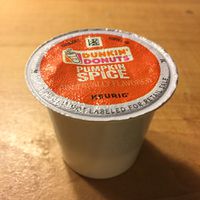Keurig 2.0
Dan Tobias (Talk | contribs) (→Links) |
Dan Tobias (Talk | contribs) |
||
| Line 3: | Line 3: | ||
|subcat=Bar codes | |subcat=Bar codes | ||
|released=2014 | |released=2014 | ||
| + | |image=IMG 3766.JPG | ||
}} | }} | ||
| − | One wouldn't think that coffee and coffeemakers were subject to file format issues, but the '''Keurig 2.0''' coffeemakers released in 2014 were, unlike earlier versions of the single-cup coffeemakers of that brand, subject to an obnoxious form of digital rights management that scanned the cover of the coffee packaging to ensure that only true Keurig-licensed coffee was used. This apparently involved optical scanning of some sort of code on the cover, | + | One wouldn't think that coffee and coffeemakers were subject to file format issues, but the '''Keurig 2.0''' coffeemakers released in 2014 were, unlike earlier versions of the single-cup coffeemakers of that brand, subject to an obnoxious form of digital rights management that scanned the cover of the coffee packaging to ensure that only true Keurig-licensed coffee was used. This apparently involved optical scanning of some sort of code on the cover, apparently a small bar-code format. Supposedly this includes some manner of distinguishing varieties within the product line (coffee vs. tea, different sizes, etc.) in order to set the machine properly, but the main purpose seems to be to try to stop people from using competing coffee pods that don't pay a fee to Keurig. |
== Links == | == Links == | ||
Revision as of 23:36, 10 October 2016
One wouldn't think that coffee and coffeemakers were subject to file format issues, but the Keurig 2.0 coffeemakers released in 2014 were, unlike earlier versions of the single-cup coffeemakers of that brand, subject to an obnoxious form of digital rights management that scanned the cover of the coffee packaging to ensure that only true Keurig-licensed coffee was used. This apparently involved optical scanning of some sort of code on the cover, apparently a small bar-code format. Supposedly this includes some manner of distinguishing varieties within the product line (coffee vs. tea, different sizes, etc.) in order to set the machine properly, but the main purpose seems to be to try to stop people from using competing coffee pods that don't pay a fee to Keurig.
